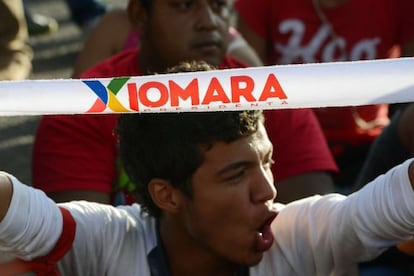Former Honduran leader to challenge his wife’s presidential election loss
Zelaya calls supporters to take to streets after conservative was declared winner

Cheerful, smiling and assured of his own victory, Honduran President-elect Juan Orlando Hernández appeared before the cameras late Monday to tell his constituents that voters opted for “peace instead of political violence” when they picked him as their next leader in Sunday’s ballot.
“A part of the electorate didn’t vote for me, but I am going to govern on behalf of everyone,” said the 45-year-old former Congress speaker. Hernández of the National Party was slightly ahead of his closest contender, former first lady Xiomara Castro, by little more than five percentage points, according to the latest election results.
It may be a sufficient enough margin to dispel any speculation of voter fraud. But in a society that is still polarized by the 2009 coup that ousted leftist President Manuel Zelaya, a large sector of Hondurans who supported their former leader believed that they would be vindicated at the polls.
Zelaya’s wife Castro declared herself the winner at around 8pm on Sunday night and by early Monday morning her Freedom and Refounding Party (Libre) was claiming that there had been hundreds of irregularities at voting tables across the country.
“We are going to court to defend the victory we won in the polls,” said Zelaya, who served as his wife’s campaign manager during a meeting with Libre supporters at a hotel in Tegucigalpa. “And if necessary, we will take this to the streets.”
A lot of those supporters were teargased in demonstrations that took place in the Honduran capital following Zelaya’s ouster by the army in June 2009. The Organization of American States (OAS) tried unsuccessfully to have his government restored but, resisting international pressure, de facto President Roberto Micheletti instead called elections for November that year, which were won by the now outgoing President Porfirio Lobo.
Zelaya, who was forced out of the country and flown to Costa Rica, was unable to return to Honduras until 2011. In 18 months, he formed the Libre party, which groups followers from all sectors, including private businessmen, union leaders and radical leftists.
Zelaya said that before his supporters take to the streets, his party will ask for an official recount.
With 67.65 percent of the ballots counted, the Supreme Electoral Tribunal (TSE) reported that Hernández and his National Party had garnered 34.08 percent opposed to Castro’s 28.92 percent of the vote.
Zelaya charged that electoral authorities had ignored 20 percent of the voting tables where Libre had been the winner. Early on Sunday, when the first results began trickling in, the former first lady was reportedly ahead by 10 percent.
For his part, Lobo played down Zelaya’s charges by officially declaring Hernández, his political heir, as the winner.
“This has become a preliminary political crisis that will affect the transition. Libre is a new force convinced by its victory, and there will be resistance concerning those results,” said Gustavo Irías, director for the Center of Democracy Studies.
The president-elect has already promised to call out the military in the streets “to eradicate crime.” In Honduras, an average of 22 murders take place every day and police are often in cahoots with organized crime members.
“These elections have been a referendum on whether to accept a military police force,” Hernández said on Monday.
Tu suscripción se está usando en otro dispositivo
¿Quieres añadir otro usuario a tu suscripción?
Si continúas leyendo en este dispositivo, no se podrá leer en el otro.
FlechaTu suscripción se está usando en otro dispositivo y solo puedes acceder a EL PAÍS desde un dispositivo a la vez.
Si quieres compartir tu cuenta, cambia tu suscripción a la modalidad Premium, así podrás añadir otro usuario. Cada uno accederá con su propia cuenta de email, lo que os permitirá personalizar vuestra experiencia en EL PAÍS.
¿Tienes una suscripción de empresa? Accede aquí para contratar más cuentas.
En el caso de no saber quién está usando tu cuenta, te recomendamos cambiar tu contraseña aquí.
Si decides continuar compartiendo tu cuenta, este mensaje se mostrará en tu dispositivo y en el de la otra persona que está usando tu cuenta de forma indefinida, afectando a tu experiencia de lectura. Puedes consultar aquí los términos y condiciones de la suscripción digital.








































